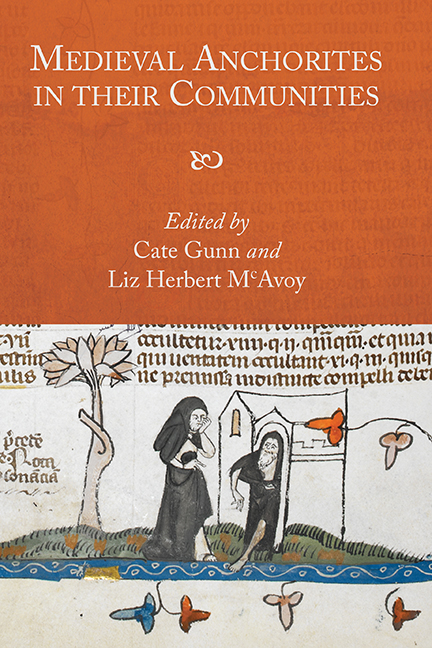Book contents
- Frontmatter
- Dedication
- Contents
- List of Illustrations
- Acknowledgements
- List of Contributors
- Abbreviations
- Introduction: ‘No Such Thing as Society?’ Solitude in Community
- 1 ‘O Sely Ankir!’
- Part I Religious Communities
- 2 The Anchoress of Colne Priory: A Solitary in Community
- 3 Anchorites in their Heavenly Communities
- 4 Rule Within Rule, Cell Within Cloister: Grimlaicus's Regula Solitariorum
- Part II Lay Communities
- Part III Textual Communities
- Bibliography
- Index
- Miscellaneous Endmatter
3 - Anchorites in their Heavenly Communities
from Part I - Religious Communities
Published online by Cambridge University Press: 30 August 2017
- Frontmatter
- Dedication
- Contents
- List of Illustrations
- Acknowledgements
- List of Contributors
- Abbreviations
- Introduction: ‘No Such Thing as Society?’ Solitude in Community
- 1 ‘O Sely Ankir!’
- Part I Religious Communities
- 2 The Anchoress of Colne Priory: A Solitary in Community
- 3 Anchorites in their Heavenly Communities
- 4 Rule Within Rule, Cell Within Cloister: Grimlaicus's Regula Solitariorum
- Part II Lay Communities
- Part III Textual Communities
- Bibliography
- Index
- Miscellaneous Endmatter
Summary
WHILE rarely the focus of critical attention, the angel has long since hovered beside the solitary in the history of anchoritic spirituality. According to the conceptualisation of the religious life known as the vita angelica, men and women who devoted themselves to contemplation of God and renounced the world lived in imitation of, and even association with, the angels of heaven. As Jean Leclercq states in his chapter on the angelic life in La Vie parfaite:
The more a person is shut off from the world, the more he is open to heaven. The more he abandons the world, the more he enters again into the state which preceded sin, when man lived in familiarity with the angels.
[plus on se ferme au monde et plus on s'ouvre au ciel; plus on quitte le siècle et plus on rentre dans l’état qui a précédé le péché, alors que l'homme vivait dans la familiarité des anges.]
Does it follow, therefore, that the most physically isolated of all religious people – anchorites – had the closest relationship of all to the celestial beings they emulated? Leclercq certainly suggests that this was the case. Later in his discussion, he provides the following extract from Nicholas of Clairvaux's sermon, On the dedication of a church:
[Hermits] hide themselves […] in the mountain caves and in the hollows of the valleys, in order to associate with the angelic spirits. They are enraptured in the contemplation of the riches of glory…
[Ils se cachent […] dans les cavernes des montagnes et les creux des vallées, pour s'associer aux esprits angéliques: ils sont ravis dans la contemplation des richesses de la gloire …]
Here, we seem to have evidence for the idea that worshippers retreated to far-flung places with the intention of seeking out celestial beings. Yet the phrase ‘in order to associate with angelic spirits’ [‘pour s'associer aux esprits angéliques’] distorts the meaning of the Latin, which implies not that hermits deliberately sought out angels, but that their highly contemplative mode of existence united them with angels, whose very function is to contemplate God.
- Type
- Chapter
- Information
- Medieval Anchorites in their Communities , pp. 53 - 67Publisher: Boydell & BrewerPrint publication year: 2017



